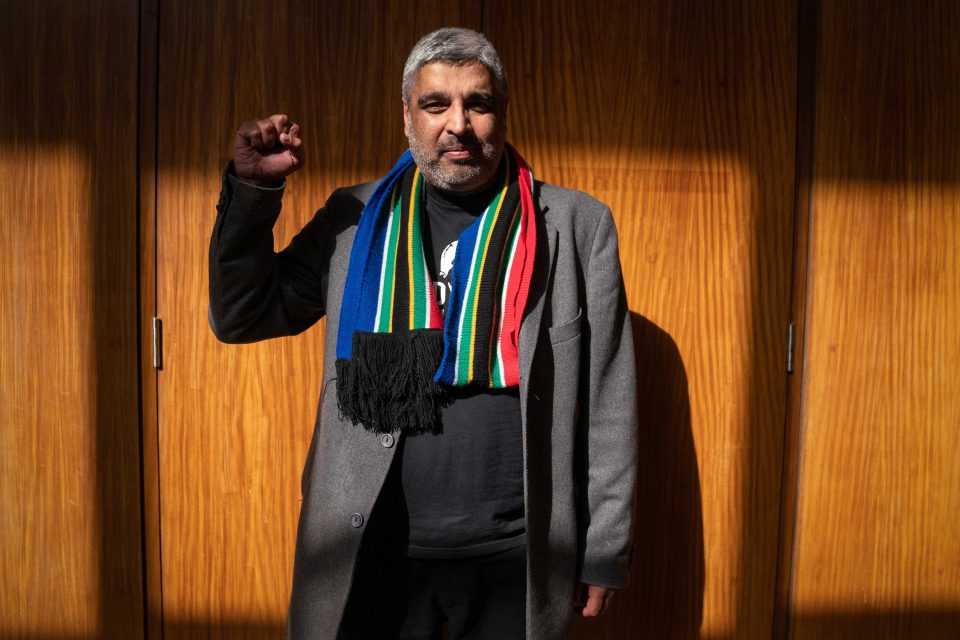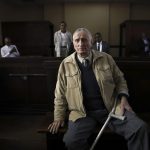Timol ruling raises hopes and poses more questions
A precedent-setting judgment has given hope to the families of those murdered by the apartheid regime, but also prompted others to call for liberation movement activists to be prosecuted.
Author:
6 June 2019

A landmark judgment has made it clear that former apartheid police officers can still be prosecuted, despite lengthy delays and old age. But as victims begin to hope that apartheid perpetrators will finally face justice, Ahmed Timol’s family, who have waited 47 years for the truth to emerge about the death of the anti-apartheid activist, are bracing themselves for further delays.
In a precedent-setting case, former Security Branch clerk Joao “Jan” Rodrigues has lost his bid to have the case against him dropped. Rodrigues applied for a permanent stay of prosecution at the South Gauteng High Court in Johannesburg after being charged for the premeditated murder of Timol and defeating the ends of justice.
The reopened inquest into Timol’s death found in 2017 that Rodrigues had been complicit in covering up Timol’s murder as a suicide. Timol was dropped from the 10th floor or the roof of the former John Vorster Square police station in the city centre after being brutally tortured by police in Johannesburg in 1971.
“The refusal of a permanent stay of prosecution is not a signalling that we are required to be vengeful to those who are alleged to have committed serious crimes in the past, but rather an affirmation that the principles of accountability and responsibility for breaching the rules of society stand at the doorway of our new constitutional order,” said Judge Seun Moshidi, reading his judgment on 3 June.
Related article:
After a lengthy battle spanning four decades to have his uncle’s killers prosecuted, Imtiaz Cajee is elated at the judgment. But he is also preparing for the likelihood that Rodrigues will now turn to the Supreme Court of Appeal.
“It is another milestone that we’ve accomplished, but we now wait for the next hurdle. The state is paying for their legal costs, so I definitely imagine that they will be appealing,” he said.
Cajee has been at the forefront of a team of lawyers, investigators, families and organisations who have taken up the laborious task of applying pressure on the National Prosecuting Authority (NPA) to prosecute apartheid-era criminals.
Among those who have spent decades waiting for surety that the truth will come out is Lasch Mabelane. The 67-year-old lives in Diepkloof, Soweto, where he holds on to the jazz LPs and old photos of his younger brother, Matthews.
Matthews is believed to have been murdered in police custody in 1977. The police said at the time that he jumped to his death from the 10th floor of John Vorster Square. It was a repeat of the story the police told the world about the death six years earlier of Timol.

The families who fight
Life hasn’t been easy for Mabelane in the aftermath of his brother’s death. His family suffered the sorrow of grief in 1977 and emerged from the Truth and Reconciliation Commission (TRC) feeling that the police had lied.
It was only after Matthews died at the age of 22 that the family became aware he was a member of the underground ANC liberation movement. At home, they knew him as a jazz lover who listened to Miles Davis and John Coltrane, and a likeable character who was popular and loved to tell jokes. It was the jokes and jazz that brought the two brothers closer together. He said the Timol judgment was a chance at justice.
“It opens the chance of us succeeding when we go to court with the apartheid policemen who have also equally been responsible for Matthews’ death,” he said.
Related article:
The Timol family has had the resources to put together a fight to have their case heard. But for Mabelane, the years have been difficult financially. He lives alone and his only income is the R1 600 a month he gets on a pension. But the recent judgment has raised his hopes, and given him some reassurance that his brother’s case will finally receive attention.
Mabelane knows the names of his brother’s alleged killers, but his fear is that the delays will mean it’s already too late for the truth to come out. “I don’t know whether they are still alive. We are just hoping they are still alive so they must face the music,” he said.
The delays have also caused frustration for Lukhanyo Calata, the son of Cradock Four member Fort Calata. Calata was killed in an assassination that took the lives of three of his comrades as well, Matthew Goniwe, Sparrow Mkhonto and Sicelo Mhlauli, in 1985. They became immortalised as the Cradock Four and the liberation fighters were hailed as heroes in the Eastern Cape town of Cradock.
Calata has written a book, co-authored with public relations manager Abigail Calata, who is his wife. He had laid the blame for the lack of investigation into his father’s death with the NPA and the ANC-led government for interfering in prosecutorial decisions in TRC cases, but said the judgment is a step in the right direction.
“It is a landmark ruling. It’s precedent-setting in the sense that whenever our case is eventually ready, nobody can come back and try to use the justification of too much time has elapsed to try to avoid prosecution. We’re very grateful for that,” Calata said.
Related article:
The death of Fort Calata implicates high-ranking apartheid officials, including former president FW de Klerk, who was part of the unit in the regime’s security apparatus that decided the assassination must be carried out. Calata said the ANC was worried that if apartheid-era officials could be prosecuted then the ANC might face prosecution for its liberation campaigns, which may have endangered the lives of civilians outside the armed struggle.
His reasoning echoes allegations of political interference made by former National Director of Public Prosecutions Vusi Pikoli in court papers in 2015. Pikoli admitted that he had been stopped from making prosecutorial decisions in TRC-related cases because of political interference from ANC members of the executive in Cabinet.
Calata and Mabelane are just two of the 300 cases that the TRC referred to the NPA for further investigation and prosecution once the commission had concluded. Moshidi’s judgment has now said that NPA boss Shamila Batohi should assess whether or not an action is warranted in response to political interference at the NPA. He also ordered that the prosecuting authority and the executive branch of government assure the public that such interference in TRC cases will never occur again.
“In this regard, they should indicate the measures, including checks and balances, which will be put in place to prevent a recurrence of these unacceptable breaches of the Constitution,” he said.
NPA spokesperson in Gauteng Phindi Mjonondwane said there is “a whole lot of work happening” on other TRC cases that have seemingly received less attention than the Timol case.
“We plead with the public to bear with us,” she said.

The other side
This judgment, however, has also had an impact on the former apartheid police officers who have been following the Timol case.
Jan Wagener is an attorney representing three of the accused in the disappearance of Umkhonto weSizwe activist Nokuthula Simelane. Her family has applied to have the courts formally declare her presumed dead, 36 years after she disappeared. Her sister, Thembi Nkadimeng, has spent three decades hoping for the truth of where Simelane’s remains are buried to emerge. This case was scheduled to be heard on Thursday 6 June.
Wagener has said that other former police officers who stand to be investigated for their roles in the 300 TRC cases at the NPA have approached him for representation. He said the latest judgment has opened the doors for activists in liberation movements in South Africa to be prosecuted for campaigns that may have killed civilians.
“There should be equality. There were two sides to the conflict of the past … If you have to start prosecuting everyone, it will take our country way back again to where we were a few decades ago, because there were many crimes committed on all sides of the conflict,” he said.
Wagener knows his views are not popular. But he does have pockets of support. The Foundation of Equality before the Law, an organisation representing former apartheid police officers who defended the conduct of the regime security forces at the TRC, has been following the Timol case.
Johan van der Merwe, a trustee of the organisation and the last apartheid-era national police commissioner, said that the prosecution of Rodrigues would be unfair if members of the ANC and Pan Africanist Congress of Azania – particularly the party’s military wing, the Azanian People’s Liberation Army (Apla) – were not prosecuted.
“Although complete dockets were before 1994 handed to the National Prosecuting Authority against all NEC [ANC national executive committee] members involved in these incidents, not a single NEC member has yet been prosecuted,” said Van der Merwe.
He pointed specifically to the case of expelled former PAC president Letlapa Mphahlele, who gave the order for the St James Church massacre in Kenilworth, Cape Town, in which Apla members fired automatic weapons and threw two grenades into a congregation of around 1 000 people on 25 July 1993. Eleven people were killed and 58 injured.
Mphahlele applied for amnesty at the TRC, but his application was struck from the roll after he failed to attend the hearing. Van der Merwe said he is among those from within the liberation movement who should be charged and prosecuted.
For Cajee, however, not all responses from the liberation movements should be treated as equal to the violence the state perpetrated against those it oppressed.
“The entire ANC executive testified at the TRC and from a layman’s perspective, I can understand the context under which the armed struggle had embarked on. I personally can’t see how anybody from the liberation struggle can be held liable for conducting certain acts because it was part of the armed struggle,” he said.
Awaiting trial
The Timol family will now wait for the trial. Their legal team, as well as other families, think it likely Rodrigues will appeal against the judgment – he has two weeks to respond. So far, Ben Minnaar, Rodrigues’ attorney, has been unavailable for comment. But he has told journalists he is studying the judgment.
Former TRC commissioner Yasmin Sooka has expressed support for the judgment, along with the Steve Biko Foundation and the NPA. But for Cajee, the work is not yet done.
After the years it has taken to have his uncle’s case heard in court, he has now turned his attention to the political interference in the NPA that led to the delays in prosecution. He is ready to fight, regardless of how long it takes for the trial to begin.
In his judgment, Moshidi said the Timol case is a reminder that justice for past atrocities should not be compromised to build a democratic South Africa.
“Importantly, this case reaffirms that justice and the truth were never meant to be compromised during all that our young society sought to do in dealing with its troubled, turbulent and shameful past,” he said.



